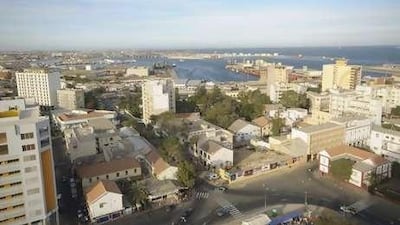Dubai is expanding its links with Senegal as Emirates Airline launches flights to the West African country's capital city, Dakar. The direct flights, to begin operating five times a week from September 1, are the latest economic connection between Dubai and Senegal, which is on the Atlantic coast.
"It marks the first scheduled air link between Dakar and Dubai," said Tim Clark, the president of Emirates Airline. "Like Dubai, Dakar has a long history as an important trading port. This new route will establish a whole new artery of trade. Dakar will become significantly closer to key global markets, including the Middle and the Far East. Emirates's new service will introduce a brand new audience to Senegal, stimulating tourism, commerce and creating jobs."
Mr Clark expected a clear boost in the value of non-oil trade between the UAE and Senegal, which he said increased to US$184 million (Dh675.8m) last year from $14m a year in 2003. "A direct air link between our nations, facilitating the movement of business and leisure travellers, can only boost these volumes and support trade ties further," he said. Dubai's economic links with Senegal include operations by the ports company DP World, which is developing and operating Dakar's existing container terminal. The company also plans to invest in a new container terminal. DP World in March signed an agreement with the African Development Bank for a ?47.5m (Dh226.7m) loan to finance an upgrading of the existing Dakar container terminal.
"The projects are still going on, and those are some of the projects that we have put in place to position Dakar to be known not only on the air traffic side, but for the port side as well," said Ibrahima Cheikh Diong, the managing director of the international co-operation department in Senegal. In addition, Jebel Ali Free Zone two years ago announced it planned to build an $800m economic free zone next to the new Blaise Diagne International Airport, which is under development, saying the zone would open this year and attract 1,000 companies.
"It hasn't opened yet and the project is still in the making in terms of setting it up," Mr Diong said. "We need to look beyond just the new routes that are opening up to Dakar. The free zone will be next to the new airport, so therefore it will provide cargo opportunities." The free-zone project was advancing and the size of the original investment had not changed, he said. He expected economic opportunities beyond cargo. "We have been trying very hard to attract tourism from the GCC countries," he said. "We have an ambition to turn Dakar into a business tourism destination."
The Emirates link to Dubai's international air hub would address the present problem of business people having to fly via Europe when travelling to the Middle East or Asia. The Emirates Group is also expected to help set up Senegal Airlines. "We are working on the details of the partnership," Mr Diong said. Nigel Page, Emirates's senior vice president of commercial operations for the Americas and Africa, said the Dubai airline would be paid for its services and would not be investing in the Senegalese carrier.
"What has been asked is whether we can help them with technical expertise in terms of setting up the airline," Mr Page said. "We want to see a reliable carrier based here so it can feed this market from other points of West Africa for us." Mr Diong declined to comment on a project announced in 2008 by Dubai World to develop a luxury resort on Goree Island, and a bird sanctuary and game reserve near the Senegalese capital. Dubai World last year said some of its tourism projects in Africa had been put on hold.
rbundhun@thenational.ae

